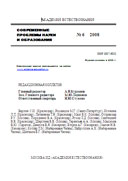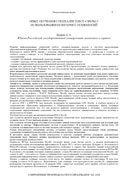PDF-версия статьи


|
In communicative behavior speech has no autonomous purpose; it is usually directed at achievement of extra speech tasks. Therefore, the communicative behavior is activity by means of the language which structure, certainly, includes not only knowledge of a language material, but also speech skills and abilities. Depending on what of aspects is initial, basic for definition of strategy of training in a foreign language, two approaches to training in this subject are allocated: linguistic, conditional and communicative and communicative.
Communicative approach assumes assimilation of a foreign language by means of communication. As one of key concepts of this approach in the foreign and domestic theory of foreign languages training the communicative competence is as a phenomenon reflecting abilities of the person to speech communication acts. Communicative activity is a system of consistently being developed actions, each of which is directed on the solution of a private task and can be considered as some "step" in the direction to the communication purpose.
Analysis of educational-cognitive activity showed that the most effective are searching for information, publication and electronic communication, which form the basis of Internet lesson, involving classroom and independent work of students. In computer-mediated learning environment various forms of Internet lesson teacher develops in accordance with the curriculum of the subject and the basic textbook of practical or theoretical course.
In our study, the concept of "Internet Lesson" is used as: 1) the outline of learning activities in the form of information resources available in the learning portal of the faculty available to students on the Internet, 2) a type of educational activity (genre of a lesson) , a basis of full-time class, and 3) the module of e-course, which includes training materials (resources), communication services (forums) and automated monitoring forms (tests). Internet lesson aims to train all aspects of speech activity; however, taking into account the linguadidactic properties of the virtual environment is mostly designed for independent work of students.
The results of the study can be used for practical teaching of language and culture to students both in the philological department of higher education, as well as students of non-language specialties and correspondence school.
BIBLIOGRAPHY
1. Иванова, Е.В. Формирование информационной компетентности – важнейшая задача профессиональной подготовки учителя [Электронный документ] // Конгресс конференций «Информационные технологии и образование», 2003. − Режим доступа: www.ito.su/2003/II/3/II−3−3307.html
2. Астафурова, Т.Н. Компетентностный подход в лингводидактической парадигме // Материалы региональной научной конференции Поволжья и Северо-Кавказского региона, г. Волгоград, 19-21 апреля 2004 г.
– Волгоград: Волгоградское научное издательство, 2004. − С.41−45
ОПУБЛИКОВАНО
Ormanova Zh.B., Emkulova Z.A., Berdauletova Sh.Zh., Meirbekova R.T., Shokhakhov I.S. DEVELOPMENT OF STUDENTS’ INTERCULTURAL COMPETENCE IN THE PROCESS OF FOREIGN LANGUAGE TEACHING . // Современные проблемы науки и образования - 2015.-№6. (приложение "Педагогические науки"). - C. 7